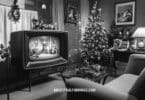The cold of December bit deeper than the mud underfoot, making every breath visible in the icy air. Private William Roberts adjusted his scarf, but it did little to stop the chill from creeping into his bones. The trench, stretching endlessly along the Western Front, was quiet except for the distant rumble of artillery—a dull reminder that war never truly slept.
It was Christmas Eve, but there was no comfort in the thought. Christmas, once a time for warmth and family, now felt like a relic of another life. William tried not to think of Mary, his fiancée back home in London, or the small flat they had planned to move into after the war. It hurt too much.
“You look miles away,” said Corporal James Turner, his voice gruff but not unkind.
“Just thinking,” William replied, offering a weak smile.
The truth was, he was thinking of home, of Christmases past when he and his family had gathered around the fire, singing carols and exchanging gifts. Those memories felt impossibly distant now.
The night wore on, cold and uneventful, until something broke the stillness. A sound, faint at first, floated across no-man’s-land. William paused, his head tilting as he tried to make sense of it.
“What’s that?” James muttered, his brow furrowed.
The sound grew clearer, unmistakable now. Singing. The words were in German, but the melody was one William knew well:
“Stille Nacht, heilige Nacht…”
“Silent Night,” he whispered, his breath catching.
The men in the trench fell silent, listening. Then, one of the British soldiers began to hum along, hesitant at first but growing bolder. Others joined in, their voices rising in harmony with their unseen German counterparts. For a moment, the war seemed to fade, replaced by a shared melody that transcended language.
When the singing stopped, the stillness returned. Then, from the German trenches, a voice called out:
“English! Merry Christmas!”
William froze, his pulse quickening. Was this a trick?
Another voice shouted back, this time from the British side: “Merry Christmas!”
Cautiously, a figure emerged from the German trenches. He carried a lantern, its light bobbing with each step. He raised his hands high, showing he was unarmed.
“What the bloody hell is he doing?” James muttered, gripping his rifle.
William didn’t answer. He was already climbing out of the trench.
“Roberts, get back here!” James barked.
But William didn’t stop. Something about the sight of the German soldier, his breath visible in the frosty air, made him believe this wasn’t a trap. As he stepped into no-man’s-land, others followed, British and German alike, until the barren stretch of earth was filled with men.
“Franz,” said the German soldier, extending a hand.
“William,” he replied, shaking it.
The handshake was awkward, hesitant, but it marked the beginning of something extraordinary. The men exchanged small gifts—cigars, chocolate, buttons from their uniforms. Someone produced a football, and what began as a tentative kick-around soon turned into a full-fledged match. Laughter echoed across the battlefield, mingling with shouts of encouragement.
William found himself running alongside Franz, the two of them grinning like schoolboys.
“You play well,” Franz said, his accent thick but his meaning clear.
“Not as well as you,” William replied, panting.
The game ended in a draw, though no one cared about the score. The men returned to their makeshift gathering, sharing stories and songs. Franz spoke of his wife and children in Cologne, his voice tinged with both pride and longing. William listened, nodding along, though he couldn’t help but think of Mary.
“You miss her,” Franz said, his gaze soft.
William nodded. “Every day.”
The night stretched on, and for a few precious hours, there were no sides, no uniforms—only men, connected by their shared humanity.
But as dawn approached, the mood shifted. Orders were orders, and the war could not be paused indefinitely. The men shook hands, their goodbyes heavy with the weight of what lay ahead.
As William climbed back into his trench, he turned for one last look at Franz. Their eyes met, and for a moment, no words were needed.
The first shots of Christmas morning shattered the fragile peace.
Years Later
William sat by the fire, the warmth soothing his old bones. His grandchildren gathered around him, their faces alight with curiosity.
“Tell us about the war, Grandpa,” one of them said.
He hesitated. How could he explain the horrors he had seen, the friends he had lost? But then he thought of that night, of the singing, the football, and Franz.
“There was one night,” he began slowly, “when we weren’t soldiers. Just men, sharing Christmas under the same sky.”
The room fell silent as he told the story, his voice steady but tinged with emotion. He spoke of the songs, the gifts, the game. He told them about Franz and the brief moment of peace that still shone brightly in his memory, even after all these years.
When he finished, the children were quiet, their expressions thoughtful.
“Did you ever see Franz again?” one of them asked.
William shook his head. “No. But I like to think he made it home, just like I did.”
As the fire crackled and the family settled in for the evening, William stared out the window at the night sky. Somewhere, he thought, Franz was under the same stars, remembering that night just as he did.
It was the Christmas Truce of 1914—a fleeting moment of humanity in the midst of war, a reminder that even in the darkest times, peace is always possible.






